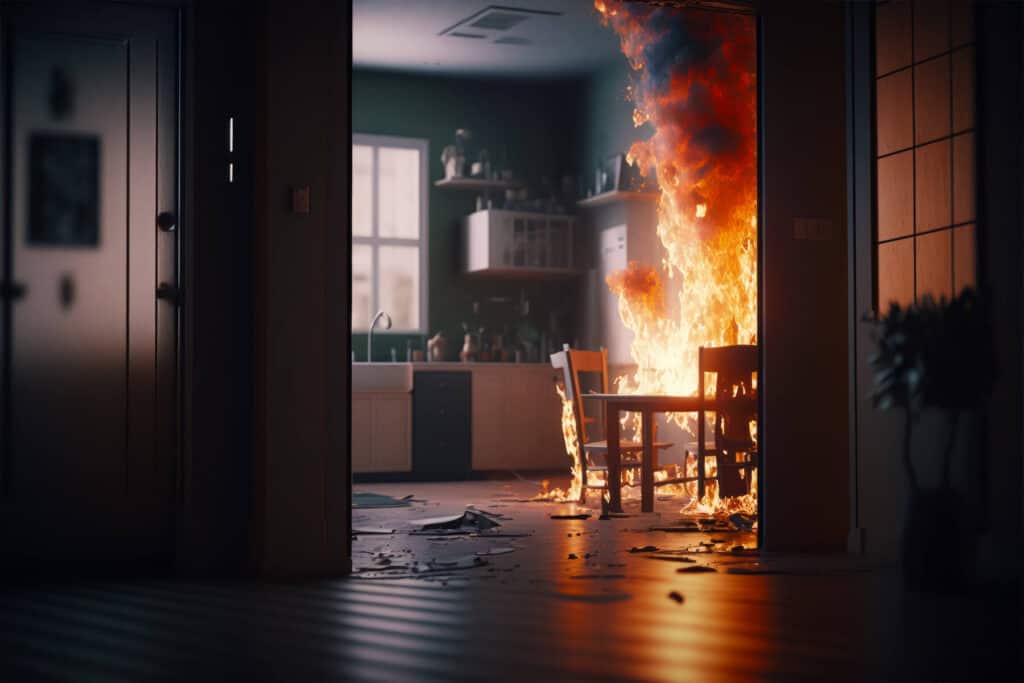House fires create an extremely dangerous situation for children and their families. While fires can be unpredictable and scary, the best defense against a fire is to be prepared. Learn more about how you and your family can stay safe in the event your house catches on fire. These safety tips and tricks will help you to get out safely and soundly should you encounter a fire or help to prevent a fire from ever starting.
How Fires Start
A fire can start in any location, from your home to storage buildings to garages and office buildings or even in the woods. Most often, house fires start in basements or garages. This is due to fact that the key components in creating a fire (heat or flames, fuel, and oxygen) are plentiful in these environments. If your garage or basement is full to the brim with your belongings, it could be a potential fire hazard. As a general rule, avoid stacking clutter and papers in basements and garages. Consider getting a shed or carport to create more room in your garage if you find it impossible to avoid clutter. Also, avoid storing excess amounts of paper, wood, and other flammable objects in these spaces. Never store paint cans or flammable objects like paper, cardboard, or furniture near hot water heaters or pilot lights.
It is recommended that families check their home for potential fire hazards every now and again. If your home construction includes a fireplace, make sure to inspect that as well. Blockages in the chimney flue can cause a house fire to start. Remember that the key to stopping fires from starting in homes and garages is prevention!
Creating a Family Plan for Fires
Residential fires pose the largest threat to children because they are unaware of the dangers associated with fires. Smoke inhalation, burns, and other detrimental injuries can occur during a house fire. For this reason, it is important to educate yourself on the dangers of fires and how you can quickly and safely make it out of your house in the event of an emergency. Spend some time with your children to go over your plan in the event of the emergency.
Fire Exit Strategies
Your ability to exit your house quickly is dependent on one thing: fire alarms! Your home should have fire alarms installed in each room so that they can warn you when danger is near. As a family, create an escape plan should a fire occur in your home. Assign tasks to each member. For instance, you might put the kids in charge of a job like grabbing flashlights and batteries from the emergency pack. Then, walk your child or children through the home and let them help you decide which ways out are the best in case of a fire. Map this plan out on a piece of paper for them, and make sure to practice exiting on a regular basis. This will help ensure that should the time come when you need to escape a fire, you will be ready to do so safely.
Other Ways to Be Prepared and Safe
Complete a home safety inspection with your family from time to time to help ensure that your house does not catch on fire. Check all areas of the home for fire hazards, including the kitchen, bedrooms, basements, and garage and storage buildings. For instance, in the kitchen, check to make sure that the stovetops and countertops are clear of clutter. When cooking, pot handles should always be turned inward so that they do not get knocked or bumped. An adult should always be present when cooking in the kitchen, especially with a gas stove. Throughout the house, make sure that there are smoke alarms on every level and that they have batteries and are in working condition. Exits in your house should be clear and easy to get to in case of an emergency. Also, make sure that you have a fire extinguisher: They can help put out a minor fire before it gets worse. Finally, go over the list of emergency contacts with your children. Of course, the first number you should teach them to call in the event of a fire emergency should be 911.



